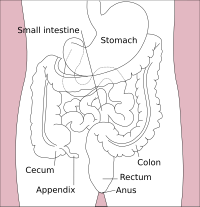
Photo from wikipedia
Myocardial ischemia/reperfusion (I/R) injury after percutaneous coronary intervention (PCI) is common in acute myocardial infarction. Aspirin is commonly prescribed as anti-thrombotic therapy with coronary heart disease (CHD). However, long-term use… Click to show full abstract
Myocardial ischemia/reperfusion (I/R) injury after percutaneous coronary intervention (PCI) is common in acute myocardial infarction. Aspirin is commonly prescribed as anti-thrombotic therapy with coronary heart disease (CHD). However, long-term use of aspirin causes severe gastric mucosal damage. Gastrodin is a Chinese natural medicine with anti-inflammatory and anti-oxidative properties. In this study, we investigated the effects of combined therapy with aspirin and gastrodin on the myocardial and gastric mucosal injury in response to myocardial I/R injury and underlying mechanisms using the Sprague-Dawley (SD) rat model. Our results demonstrated that myocardial I/R caused significant cardiac dysfunction and gastric mucosal damage. Administration of aspirin led to significantly reduce myocardial infarction size and myocardial enzyme release, as well as significantly improved cardiac function through exerting anti-inflammatory effects. However, aspirin exacerbated gastric mucosal damage by increasing the levels of inflammatory mediators and endothelin (ET) while reducing prostaglandin E2 (PGE2) levels. The combined treatment with aspirin and gastrodin not only significantly protected gastric mucosa by normalizing the expression levels of the inflammatory factors, ET and PGE2, but also significantly reduced myocardial infarction size and improved cardiac function by inhibiting inflammation in response to I/R. The combination therapy also dramatically down-regulated the levels of pyroptosis-related proteins in the myocardium and gastric mucosa. The combination therapy showed obviously reduced level of thromboxane B2 (TXB2), which was simultaneously accompanied with increased levels of the tissue plasminogen activator (t-PA). This suggested that gastrodin did not inhibit the anti-thrombotic function of aspirin. Accordingly, aspirin in combination with gasrtodin protected the structural and functional integrity of the heart and stomach by suppressing pyroptosis and inflammation. Therefore, combination of aspirin and gastrodin is a promising treatment for cardiac dysfunction and gastric mucosa injury after myocardial I/R.
Journal Title: Frontiers in Pharmacology
Year Published: 2022
Link to full text (if available)
Share on Social Media: Sign Up to like & get
recommendations!